“Here’s Hoping” – Interview with Kerry Brown on his new book ‘The World According to Xi’
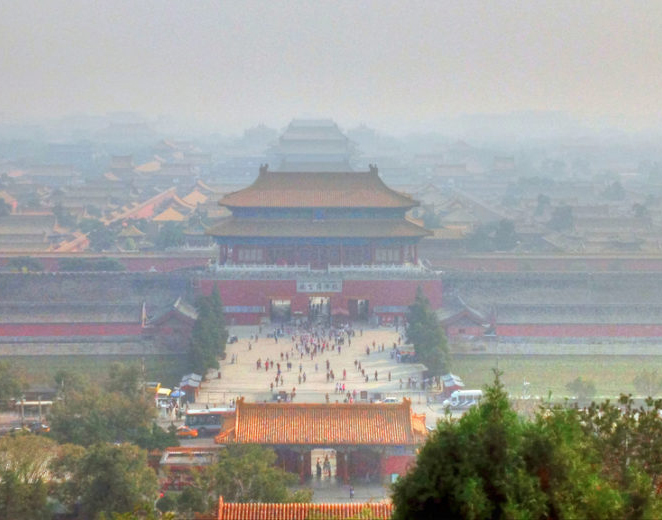
MH: Professor Brown, thanks a lot for agreeing to this interview. Your time budget must be rather small. May I ask what you are currently working on?
Two projects. One is a selection of excerpts from key writers from outside China who have written about issues related to China over the last 800 years, from the time of Marco Polo. In particular, I am taking material from figures like Matteo Ricci, Leibniz, Voltaire, Hegel, Weber, and then more recent figures like Roland Barthes, and how they tried to make sense of China as significant intellectual figures in their own cultures. The second is a longer term work on what the architecture of the bipolar world – a world divided between the values system of the US/Europe and its allies, and then China – looks like. I wanted to try to write something that acknowledges the absolute reality of the challenges China faces, but also asserts the spuriousness of thinking by moral and political berating these can be somehow wished to vanish or fade away.
MH: Let me introduce the two other participants that I asked to support me, as I’m not an expert on China: Hans-Georg Moeller from the University of Macau and Karl-Heinz Pohl, Professor emeritus of the University of Trier. Professor Pohl, would you mind to start?
KHP: My pleasure. Professor Brown, the image of China is as bad as it was last in the aftermath of 1989. There seems to be a growing hostility towards China – the new yellow peril. Is it because the media focuses only on certain selected aspects of China?
I think it is more because China is now getting richer, and the US, Europe and others – what we can broadly call the West – is not. This is different to the post-1989 situation. Then China remained relatively backward and marginal. Now it is the world’s second biggest economy and a far greater geopolitical actor. It stands poised to become the world’s largest economy in gross terms some time in the next decade. This is really the last outcome to the ‘end of history‘ narrative that people thought possible in the 1990s when the USSR collapsed and there was a sense that Communism’s days were over. China is the ultimate ‘inconvenient’ fact – a place that resolutely sticks to its political system, and which adds to the effrontery of this by also making that system seem to deliver outcomes which are competitive with capitalist systems in terms of delivering growth, etc. I think that drives some of the resentment that is felt towards China. China on the verge of perpetual collapse was always something the outside world was comfortable with. China as a winner – that’s a far trickier proposition!

Kerry Brown is Professor of Chinese Studies and Director of the Lau China Institute at King’s College, London. He is an Associate of the Asia Pacific Programme at Chatham House, London, an adjunct of the Australia New Zealand School of Government in Melbourne, and the co-editor of the Journal of Current Chinese Affairs, run from the German Institute for Global Affairs in Hamburg. He is President-Elect of the Kent Archaeological Society. From 2012 to 2015 he was Professor of Chinese Politics and Director of the China Studies Centre at the University of Sydney, Australia. Prior to this he worked at Chatham House from 2006 to 2012, as Senior Fellow and then Head of the Asia Programme. From 1998 to 2005 he worked at the British Foreign and Commonwealth Office, as First Secretary at the British Embassy in Beijing, and then as Head of the Indonesia, Philippine and East Timor Section. He lived in the Inner Mongolia region of China from 1994 to 1996. He has a Master of Arts from Cambridge University, a Post Graduate Diploma in Mandarin Chinese (Distinction) from Thames Valley University, London, and a Ph D in Chinese politics and language from Leeds University.
HGM: The title of your new book – and of a chapter in your previous one – is The World According to Xi. Reading this title, I thought of the title of the essay that made Gayatri Spivak famous: “Can the Subaltern Speak?” It seems that, despite its recent rise and economic power, China, or, more precisely, the politicians and media representing it, are still in a subaltern position on the world stage: What the world is, according to them, is, and perhaps must be, communicated by ‘Westerners’ in order to be heard internationally. As you point out in detail in your works, Chinese politicians and Chinese media tend to communicate effectively only to the “audience at home”. Globally, however, the image of China has been increasingly shaped by, if I may say so, a one-sided media narrative portraying it as a sort of Soviet-style dictatorship that cannot be defended. Some Western academics, including yourself, work at making the picture more complex and more accurate, but this does not have a major effect on the overall (media) profile of contemporary China. Do you agree with this assessment? If so, do you think that the Chinese government realizes how disadvantageous this negative profile is on the world stage, particular in the context of the new “cold war”? If so, do you think that the Chinese government, or Chinese media, is or will be capable of effectively communicating “the world according to Xi” by itself?
One review of that book, ironically by an émigré Chinese academic based long term in the West, complained that I had no right to write about how Xi saw the world because no one could make any claims about understanding this! I guess this is the thing that I am most interested in – the idea that somehow Chinese politics is unknowable, or not worth knowing about, either because it is presented in such strange and oblique terms by the main actors (Chinese politicians) or because it is not worth knowing about because they are all part of a system that is not regarded as legitimate and therefore has to be condemned even before anyone has opened their mouths. To me, there is the world of difference between trying to work out the answer to the question ‘How does Chinese politics actually work, how can we take information from Chinese society, history, the language that Chinese politicians use, what we know of their policy challenges, etc.’ and ‘Is this system something that is good or evil’.I think my function as an academic is to try and contribute to working out the first question, and perhaps saying in what ways China has an efficacious system in terms of its outputs, etc. Whether I can answer the second question is a wholly different matter. It involves bringing in a host of complex new factors like what moral system one uses, how one deploys judgements in that, issues of the role of culture, etc. Media narratives are largely guided by the need to get readers and sell papers, and to present things in a way that does this. A lot of media work on China is important, if you are talking about information gathering. But when we get to interpretation, then it becomes much more contentious. And of course, the interesting thing about the moment we are in with all the signs of division in our own societies is how much China and issues relating to China betrays a set of agendas that have nothing to do with the place itself – dislike of Communism, dislike of a different kind of society, and, yes, let’s be frank, for some (and thankfully a small minority) a sort of attitude verging on racial antagonism – this idea that an Asian country has to be forever stuck in victim mode and marginalized. This latter attitude of course I find utterly reprehensible, but there are certainly places where it manifests itself in some of the commentary I sometimes see.
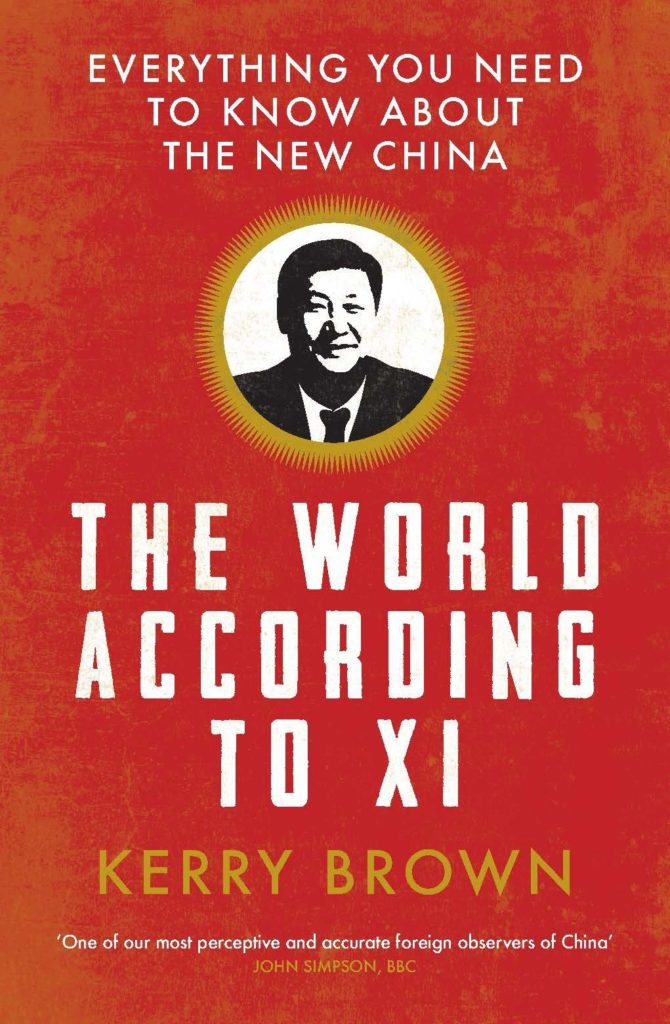
MH: I would agree with Professor Moeller, your view of China is more complex, more accurate. One could even say it in your own words: You succeeded in “telling the China story better”. Did you get any reactions from Chinese scholars or officials on your book that were … well, thankful? Or did they go more in the direction Professor Moeller pointed at: accusing you to not let China speak for itself, of eurocentric complicity?
I guess my experience in working in China over the last three decades has been that keeping an open mind is appreciated by colleagues and friends there. I try to understand the day to day challenges, and interests, and frameworks that people I meet and collaborate with there have as part of their lives, and that at least makes things more human and manageable. I really am perplexed by just how fractious the study of China has become in the last few years in particular. I guess I look back to the era during the Cold War itself in the 1950s and 1960s when figures when Franz Schumann, or John Wilson Lewis wrote about China in a way that tried to understand how it functioned under Mao, what was the role of ideology, how did the Party as an administrative entity work, etc. It seems to me that the particular political views of these writers is really irrelevant when reading their books. They are simply trying to look at an issue and get an accurate framework for best understanding it. There is nothing validating or approving, or, for that matter, condemnatory about their approach. I think this really is a model for how we should be doing the study of Chinese politics now. Let’s take an example. If I am a scientist, does it matter whether I like or dislike the phenomenon I am looking at? No. All that matters is whether I can or can’t make some sense of it. The same thing applies to looking at issues around Chinese politics or international affairs. Does it matter if I as an individual like or dislike what China does? Or is it more important to give some convincing and empirically informed model of what it is doing, and then whether it is achieving or failing to achieve its objectives. Some sinology has become far too value-laden and quick to judge. I really wonder how this works when the whole point is to try to defend some notion of objectivity, rather than collapse into immediate condemnation and judgement.
KHP: Let’s talk about the perception of Xi Jinping in the Western media. It appears to be in line with such figures as Putin, Erdogan, Trump, i.e. one of the most disliked leaders. Why is he being viewed as such a negative politician?
Chinese politicians are not exactly very easy figures to relate to. Ironically, Mao in the 1960s had some kind of following. He even appeared in pop culture. But even though Xi does try to speak in a more down to earth way than, for instance, Hu Jintao his predecessor, in terms of cultural context, reference, and the overall approachability, it’s a hard thing for him to reach non Chinese audiences – or particularly American or European ones. And as the figurehead of a system that many do not like, and a country that many probably don’t know a huge amount about, this issue of how easy he is to relate to and understand becomes even thornier. To be honest though, surveys in Australia earlier in the year showed that Xi was more popular than Trump! Maybe we just don’t like politicians period these days!
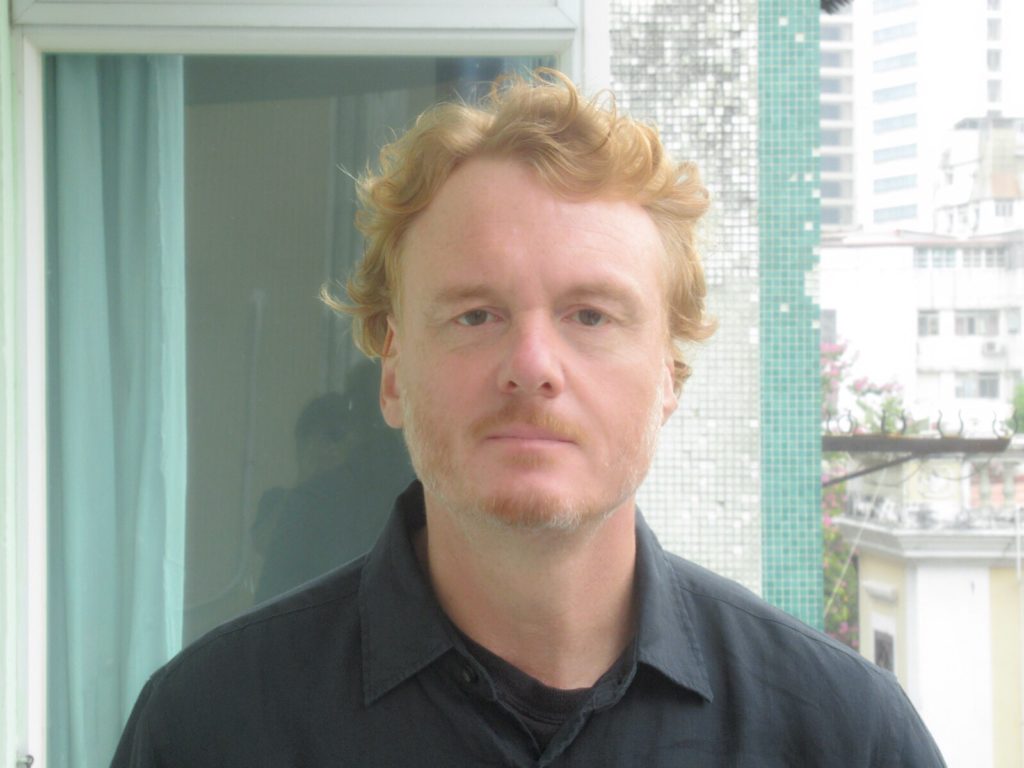
Hans-Georg Moeller is Professor of Philosophy at the University of Macau, China. He is concerned with social and existential questions against the background of Daoist philosophy and Niklas Luhmann’s theory of society. He is the author of You and Your Profile, among others: Identity after Authenticity (forthcoming) and Genuine Pretending: On the Philosophy of the Zhuangzi (both with Paul D’Ambrosio), The Radical Luhmann, The Moral Fool: A Case for Amorality (all Columbia University Press) and In der Mitte des Kreises: Daoistisches Denken (In the middle of the circle: Daoist Thought) (Suhrkamp/Insel).
KHP: Xi is the head of the CCP, and in the West, the CCP is understood as an essential evil organization (see the book “Hidden Hand: Exposing How the Chinese Communist Party Is Reshaping the World” by Clive Hamilton and Mareike Ohlberg). Why is it seen this way? What about such aspects that are in line with a tradition of Chinese meritocracy? Kishore Mahbubani (”Has China Won? The Chinese Challenge to American Primacy”) interprets CCP as “Chinese Civilization Party.” What do you think about these two books?
I resist using the word ‘evil.’ Does the Communist Party of China exist to harm and destroy people? Do its leaders get out of bed in the morning to create suffering and pain? No, I think anyone who believes that is living in a fairy tale. Yes, an organization as complex and huge as the Communist Party of China has to make or be involved with decisions where some go badly wrong. But I don’t believe that is intentional – it is the result of poor or imperfect decision making, not some existential commitment to increasing the world’s misery and suffering. The stated aims of the Party – to increase people’s well-being, to create a strong China – these are all laudable ones. The problem of course is that it has ideological and intellectual commitments to a view of history and the world which some would say are erroneous – what Isiah Berlin, the philosopher, called deterministic and over simplistic ones. If we accept that sort of analysis, then we can say the Party is ‘wrong’ or deluded. But I still don’t see how it helps to say it is evil. Evil to me seems to involve some notion of intentional commitment to harm. I don’t think that is what I see most of the time in governance in China. As for the books – they represent very different views of what kind of sense to make of China. For Hamilton, he has taken a very particular stand on what he sees as Chinese deliberate interference in the outside world. I have to say that if I were a Chinese interlocutor who wanted to answer some of his claims, I would simply express surprise at the sort of victim mentality that he speaks to. There is this strange sense of fear of China, of China somehow brainwashing outsiders and exercising this slightly sinister but hard to quantify ‘influence’. I worked in China for nearly six year, I have visited over 100 times, since 1991, every province and autonomous region, and enjoyed wonderful friendships and collaborations in China. I have sat in Party seminars and elsewhere, some of which I then got berated for by some of the new way of critics that have identified working with China as some huge crime in and of itself. I never once felt that my world view, my values, were somehow being slowly eroded and changed. I never once felt tempted to adopt a Marxist Leninist with Chinese characteristics, Maoist view of the world. So I really wonder why it is that someone like me can maintain my own very European value system, despite having being directly immersed so much in the reality of China, and yet the claim Hamilton and others make is that through very limited entities like Confucius Institutes, and clunky attempts to place China Daily supplements in Western newspapers, this is going to lead to mass conversion of Western audiences. I look at these claims and sort of feel that I clearly believe more positive things about the powers of skeptical detachment of Western audiences than some of those figures making the most noise about this imminent crisis of mass western brainwashing they seem to see around every corner they go!
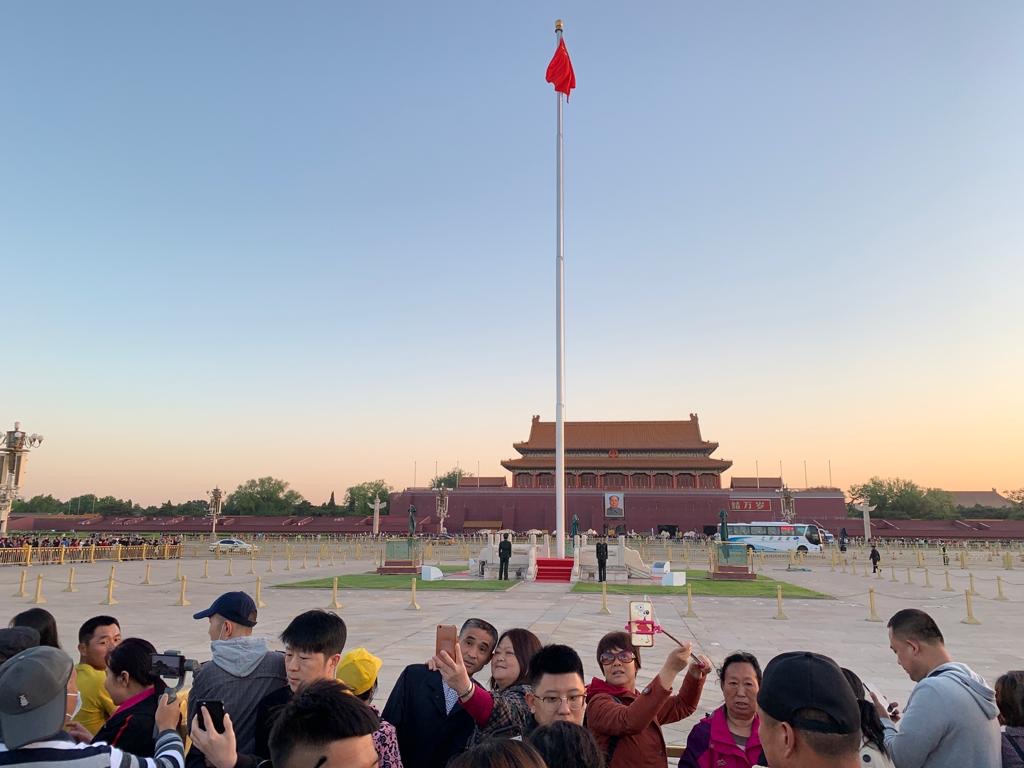
Tiananmen Square, 2019 (Photo: A. Martin)
MH: After reading your book I came across a ‘Mike Pompeo fact check’ in People’s Daily. Normally, I would have rejected most of the answers as sheer propaganda, especially the part where they talk about the party being loyal to the people. But after reading your book, I thought: ‘There’s some truth to it, Kerry Brown says the same.’
Politicians everywhere craft and then exploit messages. Let’s face it, is it so strange that China’s current leaders are leveraging their economic and geopolitical performance in ways which seem nationalistic? This is a perfect example of something that one might not like, as an outsider, but in terms of political rationality makes perfect sense.
MH: Did you receive some backlash from Western politicians or journalists for this ‘fair’ view of the party?
Most of the people I deal with are open minded, and fair minded, and I am lucky to have the sort of networks and platforms that I have enjoyed. I think this attempt to try to make sense of things is appreciated. Of course, as with the Beijing Olympics in 2008, you get many who start to pay attention to China through opportunism and the desire to find an easy platform to stand on. And I get the sense that with COVID19 emotions towards China are running high – and that there are some politicians who of course are looking for targets to blame. But on the whole, there are still plenty of places where the attitude is much more about trying to work out what is happening, and striving to get towards some valid conclusions – not starting out with the conclusions and making reality neatly fit into them!
KHP: It’s true, the way China handled the Corona crisis is seen very negative in the West. Is this view justified?
The arguments about how, and when China told the world about the virus and whether it should have acted earlier, will prove hard to definitely answer. Yes, it is very likely local officials made mistakes, and were worried about delivering bad news to Beijing. But on the other hand, it was very much in China’s interests to make sure this issue did not run away from them and spread, both in China and through the rest of the world. So this crazy notion that somehow the Chinese government deliberately tried to cause the problems that followed is just that – crazy. COVID19 has made it clear that there are deep divisions between China and the outside world. We cannot wish those away. We have to deal with the fact that they exist.
MH: Talking about facts: What were your thoughts when media tycoon Ren Zhiqiang was sentenced to 18 years recently?
Mr Ren is a brave man – he has spoken out for some time. He did have a bit of protection in the past because of his family background. But with his case we see the logic of the Xi era politics and nationalism – it is all too easy to take any statement of criticism as being unpatriotic and then condemning, and punishing, people that way. It is an objective fact: the space to talk out openly against Party policy and some of its ways of exercising power has never been great in recent Chinese history. Under Xi it has got far worse. This is partly due to the Party having far better technological means to keep tabs on people. But it does raise these questions of how it is that at a time when one would have thought there should have been more vibrant and diverse public debate, China has gone the other way. I can’t help feeling that part of this is simply the response by the leadership to where they see fractious debates lead politics in the rest of the world. But maintaining control the way they have, and treating Ren the way he has been treated, these show that there are aspects of the Xi leadership which are inhumane. That to see is a totally valid criticism to make.
KHP: There is a lot more that is being criticized in the West, such as the BRI which is portrayed as a form of neo-colonialism, also in connection with China’s policy in Africa. Do you consider this also a valid criticism?

Karl-Heinz Pohl, Professor emeritus of Sinology from Trier University. Fields of research: Chinese History of Ideas; Literature and Literary Theory; Ethics and Aesthetics of Modern and Pre-Modern China; Intercultural Communication and Dialogue between China and the West. Selected publications: Aesthetics and Literary Theory in China – From Tradition to Modernity, 2006 (in German and Chinese translation: 卜松山,中国的美学和文学理论,2010). 卜松山: 发现中国 – 传统与现代 (Discovering China), 2016 (Chinese translation of China for Beginners – in German: China für Anfänger, 2008). Editor of: Chinese Thought in a Global Context: A Dialogue Between Chinese and Western Philosophical Approaches, 1999, and (with Anselm W. Müller) Chinese Ethics in a Global Context. Moral Bases of Contemporary Societies, 2002.
I don’t think that China wants the sort of colonial burdens and responsibilities of, say, the British in running their vast empire at its heyday, or the Americans in having huge security commitments across the globe in recent times. China is creating through the BRI in Africa and elsewhere, a sort of imperium run on Chinese self-interest, and one that tries to persuade others to also view things through the narrow prism of self-interest. It does not want to get sucked into relationships where it is seen as the sort of partner that can then become deeply involved in the affairs of others, and in that way somehow directed and controlled by them.
KHP: Other areas of criticism concern the way China is dealing with Hong Kong or the Uyghurs – issues that even more upset Western observers. There seems to be an assertiveness that disregards counseling and public opinion abroad. Is that wise?
On Hong Kong, I thing the huge break down of public order over 2019 – in the eyes of Beijing at least – was something that they couldn’t politically tolerate. The National Security law was, in a sense, the most unambiguous statement that Beijing regards Hong Kong as absolutely its sovereign space. And that it feels, and perhaps knows, that the outside world can do very little to push back against this. The question is how Hong Kong performs economically. On Xinjiang, again, the assertion of Chinese central control has been brutally assertive. Yes, these issues have been catastrophic for Beijing’s global reputation. But in the calculation of the Xi government, they probably feel whatever they do will never be good enough for the outside world, and so they may as well do what they want to rather than try to appease others. The more important question is just how far the measures they have taken regarding Xinjiang will prove effective to deliver the sort of long term stability that is stated to be their aim. On that, I think there are powerfully valid grounds to be skeptical. I cannot see Xinjiang being an issue that will not increasingly figure in the future as a source of deep resentment and challenges for China. It is far too early to say, but in domestic terms alone I think it is a historic mistake.
MH: The conflict that you foresee in your book is one between those ‘party monks’ or political ascetics and those who flourish under that Party rule – who are partying instead.

Street scene in Suzhou, 2019 (Photo: M. Heidingsfelder)
I think that everyone in Chinese society has to take an attitude towards the political system under which they live. Some adopt a sort of managed indifference, where they identify the spaces they are allowed to do as they wish in, and then simply ensure that they don’t step over the boundaries – and then of course those who are more daring, and even want to go into politics through pursuing careers in the party, they have to adopt a more sophisticated and intimate relationship with the Party’s ideology and reality. The party is there, for everyone – even if only existing as a space around which they try to move without inquiring too much what it is the centre!
MH: You only briefly talk about the Trump administration. Congratulations to this self-restriction, which makes your few brief remarks stand out even more. It must’ve been tempting, but you withstood that temptation – but don’t you find it somewhat ironical that the current US administration is itself committing all the sins it accuses China of, while itself favorizing family members, committing numerous crimes, all the things Xi tries so hard to get rid of? As if we’re looking at an inverted picture?
The US China relationship has deep structural issues – a sort of clash of the universalist versus the particularist. It was always going to be a hard task to somehow make a world where you could accommodate two such basically different world views. I suppose the best you can say is that the situation we are in, adopting a harshly realist stance, is one where the US can’t really fight a war with China without bringing the whole international system and itself down with it, nor one where China with its values which are so specific and conditioned in history and society can really persuade much of the rest of the world to embrace and adopt these. As for Trump, it’s not that I have nothing to say about him, but that I accept that everyone else, including him, is too busy speaking all the time to mean that there is not much more to be said – nothing that is new anyway. Let’s face it. Every day Trump is in the White House is a day more when China gets stronger.
KHP: Almost all the world and particularly most of the Western media dislike Trump. But the Western media and public seems to be supportive of one element of Trump’ policy: his policy towards China. Also the Democrats in the US. Why?
KB: I guess because of that structural issue mentioned before – that our mindsets have largely been very comfortable with this assumption that China was either a dysfunctional basket case that would always be marginal and problematic, or that if it did develop it would need to be more politically like us. China managing to both develop and stay communist arouses irritation and anger that transcends the political divide in the US. It sort of proves too that the principle driver of US politics now is fear – and that such a negative attitude is symptomatic of a power that feels it is in decline, even if objectively it might not be.
MH: I guess you are familiar with the Henry Adams quote where he says about the US: „There are grave doubts at the hugeness of the land whether one government can comprehend the whole.“ Seems China is doing a much better job than the US at this right now.
Well, China under Xi has a national narrative that might be very problematic, but it is at least optimistic and forward looking. Modern history has been an endless challenge. Now the country is at least looking at a world where materially, and maybe in other terms too, things are going to improve. I think that contrasts with this sort of nostalgia, or commitment to preserve the status quo, that prevails in the West. Whether it is the case China has divined some amazing insight or vision no one else has worked out so far which puts it in a better position, who knows. I suspect not. But it can say in 2020 that socialism with Chinese characteristics seems to manage pandemics better than American or some forms of European democracy, and looks in a pretty good place to start facing some of the economic challenges too. And as for the West’s desire to exercise some sort of moral hegemony over China – for sure, if there was a time to do this, now was it. It is a huge pity that at this precise moment, a US president has questioned whether he would accept the outcome of an election that goes against him in November, and a British government has suggested that they might break international law.
MH: A one-party solution may not be the worst thing for this America.
I don’t think America’s issues are going to be solved by autocracy or force. In a very weird way, on the big issues like climate change, it is baffling why politics has seeped into them. If you were to say to people in the US ‘caring for the environment, living lives that weren’t wasteful, and being responsible for the natural world’, I imagine all but the true extremists would agree. But once you introduce notions like humans created climate change, etc, then suddenly division and politics appear. In a weird way it’s the same with China. If you say, ‘Having a fifth of humanity live in a way which is materially improving, where a middle class is emerging, where the country is stable and can work with others on facing global health and environment issues’ that is somewhat more palatable than saying ‘a fifth of the world’s population lives under a Communist regime which is our enemy and needs to be confronted.’’ How you describe and understand reality is important.
KHP: How do you view the reality of American measures against top Chinese IT firms, such as Huawei (G5), Tiktok or WeChat? Is it because of fear of espionage – or is it fear of losing leadership in the IT sector?
I’m not technically minded, and while I hear lots of people go on about this issue, to be honest very very few of them probably really can know much about where and how the US and China enjoy advantages, etc. All I do know is that Huawei would be a great company, one which everyone would love, in terms of price, extent of services, etc, but for one factor – it is Chinese! And so while I am sure there are a host of problems about these IT firms, and Intellectual property, and all the rest of it, it is also a very big chance to ensure that they do not get to the position of ever being competitive with US or other foreign ones. And under the transactional Trump administration, I would put principle behind the desire to shore up the US’s competitive advantages. The US and others have valid reasons for wanting more reciprocity, for sure, and getting better deals in terms of market access into China. But they also have to admit that in some areas through investment and probably necessity, Chinese companies have vastly improved their technology, and may well be ahead of everyone else. Again, it is all about mindsets. I get the sense we are intensely comfortable with a China in intellectual deficit with the West – something that was true for much of modern history till now. But the notion of China being in intellectual surplus – that has proved a hard one to embrace. But I think there are a few areas where this is definitely now the case.
KHP: Militarily speaking, the American policy towards China is containment. How will this geostrategic rivalry end? Will the Thucydides trap that Graham Allison talks about in his book “Destined for War” be inevitable?
How can the US contain China? In virtual space, China has created its own domains. And it operates in an almost amorphous, sort of spectral way, without military installations, and indeed, since 1979, largely without large scale military operations. So how do you contain something that doesn’t act in the ways great aspiring powers usually act? It’s like grasping at thin air. Sure, you can compete with China and try to push it out of international space – but that will take a huge amount of money and commitment from a world which is starting to learn, in Africa and Latin America and elsewhere, that the self-interested attitude of China is something you can work with. As for the Thucydides trap, well, it’s just a pity that some of these US analysts don’t try putting that beside the ‘Romance of the Three Kingdoms’ approach to strategy!
MH: Would you dare to briefly compare the two for us? The Trump administration and the Xi one?
It is very simple. Xi is a competent administrator. Trump is not. Nothing more to be said on this.
MH: Reagan’s speech writer once used the Lao Tzu quote “Governing a country is like cooking small fish.” He thought it would appeal to Reagan’s belief in applying only a light touch to free-market enterprise. Do you think China interprets it this way, too?
I don’t think the elite Chinese decision makers believe in the free market except inasmuch as it is a tool they can get good things from to make one party rule sustainable in their country. The market is a sort of means to an end for them, not the be all and end all of some Western thinking.
MH: Interestingly, however, Chinese and American philosophy seem to agree in their action orientation, in contrast to the European philosophy, which is more knowledge-oriented. But ‘Chinese pragmatism’ is perhaps a little more complex when it promotes non-action, would you agree? After all, of course, doing nothing must also be done.
Francois Jullien wrote some interesting things on this – the way that thinkers in the Western enlightenment tradition like Clausewitz were fixated by actions leading to achieving objectives and results – this sort of constant need to do things and change things through intervention. He compared that to the traditions going back to the Warring States in China of ‘wuwei’ – letting things imminently in a situation simply come to fruition through waiting, or simply supporting, not actively shaping. This is a massive generalization, for sure. But there does seem to be a different sort of approach to achieving things in the Chinese context even today. That is why so many are trying to work out how one can on the one hand subscribe to the Marxist Leninist determinist view of history, with its definite teleology and clear outcomes, and yet combine with Confucianism and what Lu Xun complained was its enslavement to tradition, hierarchy and social conservatism. How can China manage to be capitalist and communist? And yet, somehow, at least as of 2020, it does. It violates the sort of Western enlightenment mindset of what the philosopher A. N. Whitehead called this desire for completeness and coherency. It is incoherent, and contradictory – and yet it works!
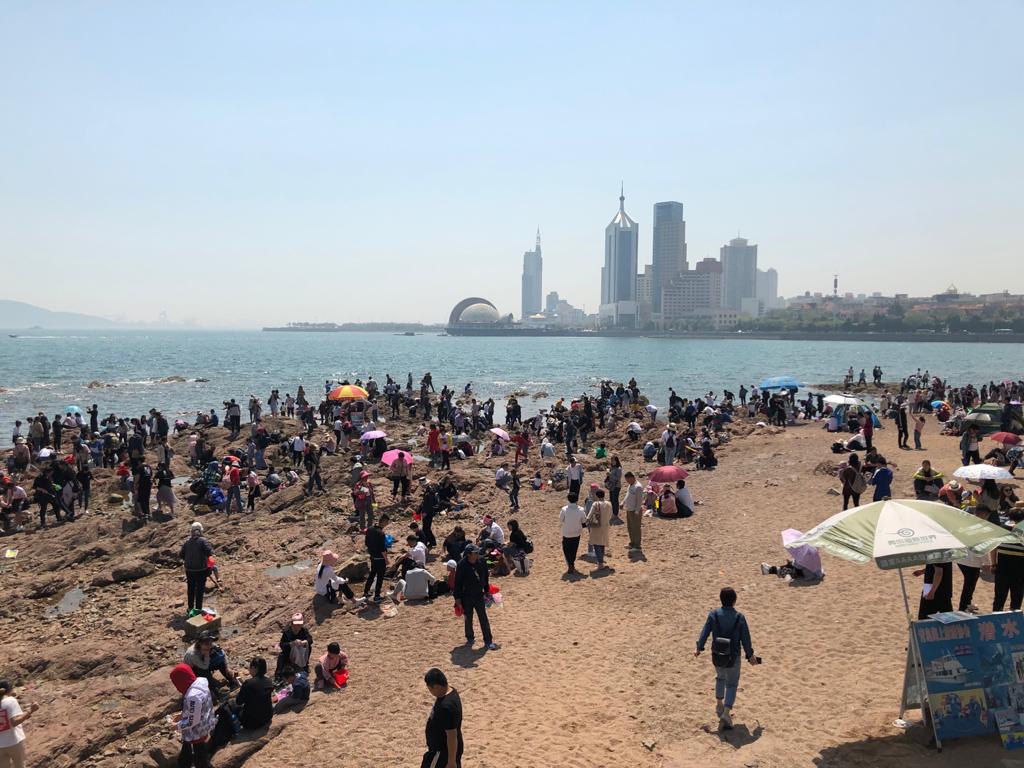
Qingdao, Shinan Zhan Bridge Bathing Beach 2019 (Photo: A. Martin)
HGM: At present, the USA seems to implement a regime change strategy regarding China which, as you show in detail in your book China’s World: What Does China Want, was already formulated at the times of the Obama administration. The purpose of this strategy, which is rhetorically supported by the media narrative of China’s “oriental despotism,” seems not to be merely political but also economical: A major aim seems to be the “opening-up” of the state-owned, or state-controlled sectors of the Chinese economy. Is this correct? If so, isn’t it the Chinese government’s responsibility to avoid such a hostile private takeover of its public economic infrastructure to prevent China from becoming (once again) an “exploited” third-world country with large-scale endemic poverty and violence (and a rich upper class), somewhat similar to “liberal democracies” such as India, Mexico, or Brazil? Put differently: Couldn’t the Chinese government communicate more clearly to the ‘West’ that “liberal democracy,” along with, in effect, an economic take-over by the ‘West,’ has not been a successful model for most non-Western countries?
China doesn’t need to say that the Western liberal model has proved very problematic in some places – it can now point at the US during the turmoil and division its society is experiencing now and say that it is problematic ever for its most ardent and most powerful supporter! I guess too we need to acknowledge that while this desire for regime change has been something many have rhetorically committed to, there is little clarity of what they are imagining China might transit to. Surely with the collapse of the USSR and all the unexpected and, in many ways unwanted, things that happened subsequently in Russia, one should be a bit skeptical about the claims by people saying that China needs to go along a path toward the US/European template of democracy to be able to solve all its issues. To be honest, China involves so many variables, and so many potential issues, to blithely subscribe to the view that political change towards a western model will solve everything is a brave thing to stand by today. For sure, China needs political change. But so does Britain, and the US, and others. We all need to be a bit modest when we start to want to mouth off about what China needs to do to improve its governance. And perhaps, dare it be said, do a far far better job at proving ours work as well as they should!
MH: Related to this question is something Professor Moeller has been writing about: the attempt of closing the Confucius Institutes, because they act ‘politically.’ The same could be said about the German Goethe Institutes – they also promote democracy, free speech, all via culture.
HGM: Liberalism has itself become a kind of dogmatic civil religion, which is spread missionarily and must not be questioned, but nevertheless propagates precisely the questioning of others. This mechanism of dialectically transforming liberalism into illiberalism is becoming more and more apparent to many people, and many have already described it, and yet it is becoming increasingly precarious politically to point it out, would you agree?
All I can say on this is that Confucius Institutes are different depending on where they are located and how they operate. It was an odd thing for the Chinese government to go along this path, and want to embed them in universities. They might have worked better as stand alone cultural and language centres, like the British Council or the Alliance Française, or the Goethe Institutes. As for liberalism, yes, defending liberalism is fine. But one can’t really see that being done intelligently and well at the moment. The best defense of liberal enlightenment values would be to show them in the way our societies operate. And at the moment, that doesn’t seem to be the case. I don’t dispute that there are plenty of issues that can be validly criticized in China and about China – what I do dispute is that this can be done in such a way that those outside trying to do this have the right to automatically assume the superiority of their world view and their values.
KHP: Apart from the Confucius Institutes, how will the academic cooperation fare in times of such new hostility? Such as Nottingham-Ningbo University, the Stanford Center etc. How do we get students to enroll in Chinese studies if China is seen as an evil empire?
At the moment the appetite for Western universities by Chinese students is still good, despite all the challenges. But I can’t see this being something that can be assumed long term. According to the Times Higher Educational Supplement this year, Chinese universities really leaped up the rankings. At some point, I imagine they will become competitive in many subject areas as the best western ones – and markedly cheaper. For sure, issues over censorship and state interference mean that someone wanting to do political science, or something like this, is likely to always want to go abroad. But in business studies, engineering, or disciplines where politic plays a less important role, studying in China becomes more and more acceptable. I do really wonder too about the attitude by some organisations towards Chinese students. Do they get treated particularly well in terms of being looked after, having their voice heard, and getting good solid teaching attention. In some places, they have become like a political football, their allegiance claimed by the Chinese government and outsiders; they have been unfairly demonized, and vast assumptions made about them. The Chinese students I know have been a diverse, often very hard working and all too often misunderstood cohort. I read one non-Chinese academic teaching at a university in Australia saying how he felt it was his task to disabuse them of their brainwashed ideas and expose them to the truth. I find that sort of attitude deeply patronizing. It also shows very little cultural and basic human empathy. A teacher who comes along subscribing to this conviction they are in possession of the Truth with a capital ‘T’ which they are then going to shower over the heads of the students exposed to them is not a teacher – they are a demagogue.
MH: Before the visit of China’s Foreign Minister, several political groups in Germany have called on to Minister Maas to address China’s anti-democratic actions. One only needs to imagine the German Foreign Minister coming to China and they would call him out because of his anti-communist ways!
They can do it – German or French, or American leaders – but the question is whether they do it effectively and compellingly. One thing is for sure; putting out stuff like the recent State Department film from the US where one of their officials spoke in Chinese about how Chinese people needed to be liberated is likely to make more people embrace their system rather than question it. Who, anywhere, likes someone marching into their lives and starting to bossily tell them they are wrong and need to change the way they do things. Once more, I don’t deny that there are powerful and compelling arguments that could be used. But how about some tact, and some self-reflection, and some humility?
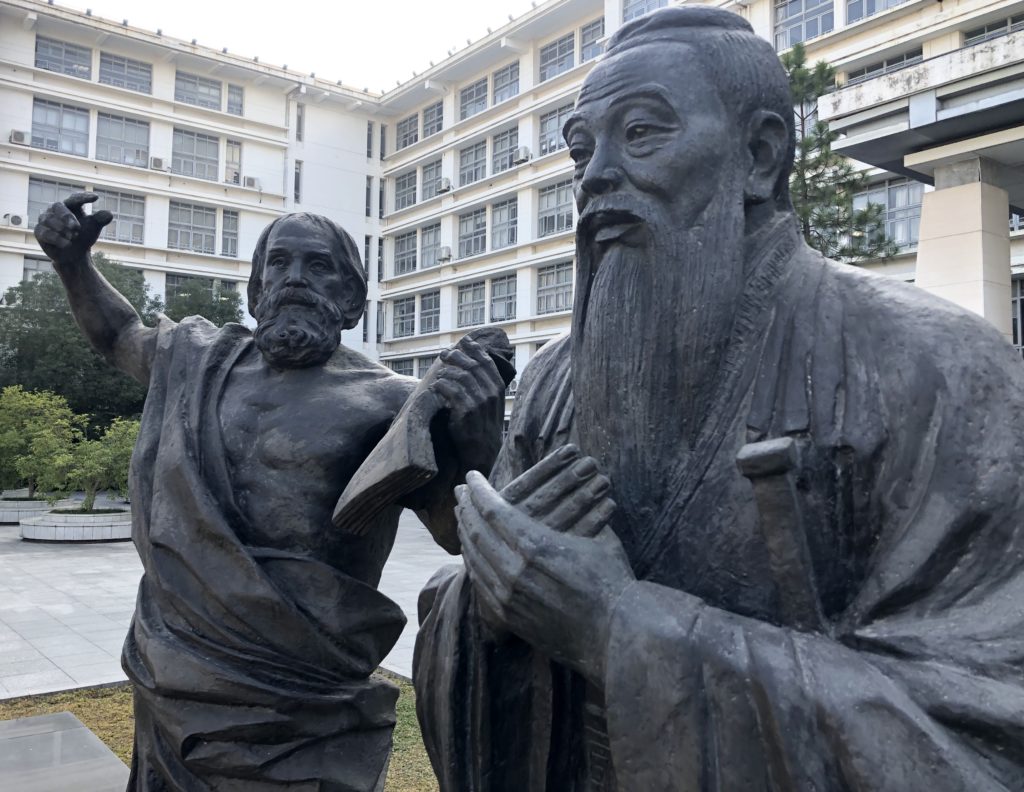
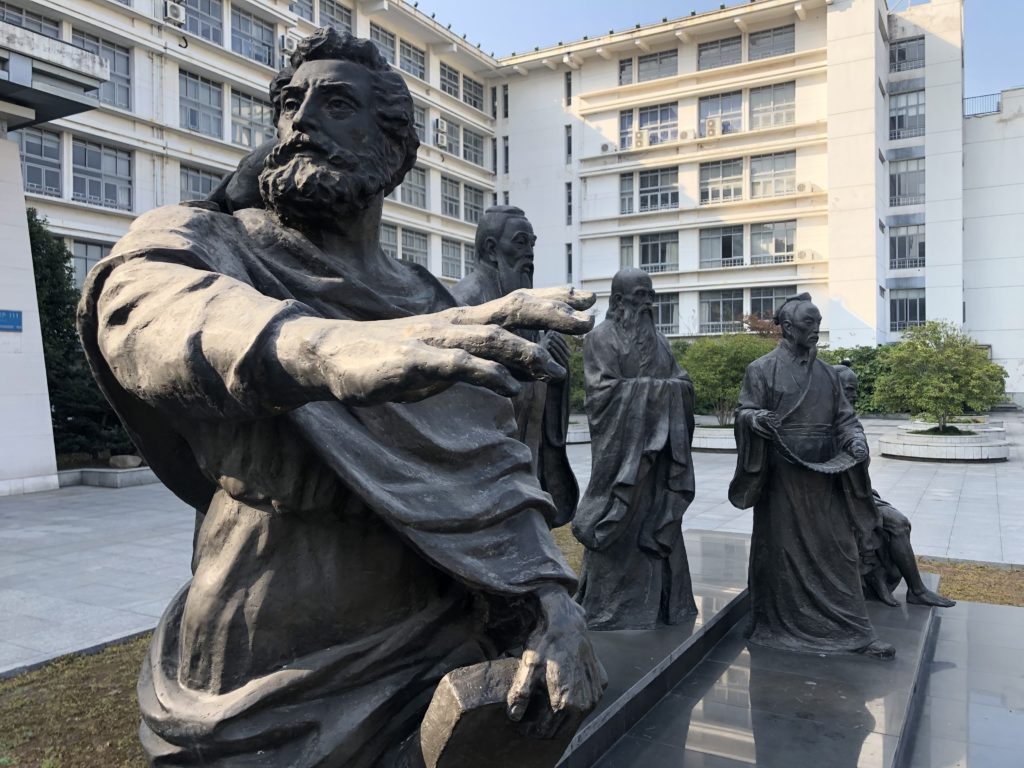
Western and Eastern philosophers debating. Bronze sculpture in front of Xi’an Jiaotong-Liverpool University, Suzhou, China (Photos: M. Heidingsfelder)
MH: Is democracy a value for you – a self-evident thing? What is your view on Daniel Bell’s praise of Chinese meritocracy, the elites ruling instead of some amateurs elected by people who are not educated and knowledgeable enough to determine who should govern?
Democracy is a value, and a great one. But it needs to be worked on, and it cannot be asserted as a God given good which just falls down from heaven like rain. And nor should there be an assumption it can take one form. Bell’s books are contentious, but they do make the point that there are some areas where administration works in China, and others where it fails. I don’t wholly subscribe to his view, but at least he has put the time and effort into trying to get to know the Chinese system. You get other approaches where the assumption from the start is that China is wholly wrong, its system is doomed, and democracy is the wholesale solution, without ever bothering to contextualize and localize these issues and make them relate to realities both in China, and about the very diverse notions of democracy that exist.
MH: I had planned to invite another colleague of ours to this talk, a German sinologist who works in China. He refused to join us: “Not because I am not interested in politics, but because it frustrates me terribly. The presence of party ideology is so overwhelming at my Chinese university that I find it difficult to not be constantly preoccupied with it. That is why I think distance is the key. To not block myself.” Do you understand that?
Yes, as the Chinese academic said, China is, and always was in modern history, a very ideological place. That remains true to this day, despite the claims that it is now simply a capitalist place run under the communist system.
HGM: I am very sympathetic to that comment. I had also set myself the goal of becoming less involved in (day-to-day) politics and not, or hardly ever, reading the news again. With regard to my SCMP text on the Confucius Institutes, I have mixed feelings in retrospect – I often think I should stay out of such things for mental health and other Daoist hygiene reasons.
Indeed. For Chinese people, they survived that archetypal Daoist, Mao. For them, Trump is just fake Dao. Nothing to fear much there!
MH: What would a public sphere ‘with Chinese characteristics’ look like from your perspective? Liang Zhiping has made a proposal that critical intellectuals should be allowed to participate freely in the process of ideology-building, because ideas imposed solely by the power of the state have little credibility – motto: ‘Let us serve.’ Naive?
There have been noble attempts over the last century, even before Communist China, to try to create this public sphere. Let’s just say that as of today, they have not succeeded. I am an optimist, though, and I wonder whether the Xi era will be the period of huge normalization, and preparation, and that finally a China undergoing its own very specific and very unique form of political change will appear. And as it did in the realm of economic change, it will surprise the world. Here’s hoping.
Interview: Karl-Heinz Pohl, Hans-Georg Moeller, Markus Heidingsfelder
Edit and lay-out: Arqam Khan
Thanks to https://www.goodfreephotos.com for the featured image (“Forbidden City under the pollution of present day Beijing”)
PS: Students interested in studying Professor Brown’s work can download some of his English articles for free here. Highly recommended. A.K.
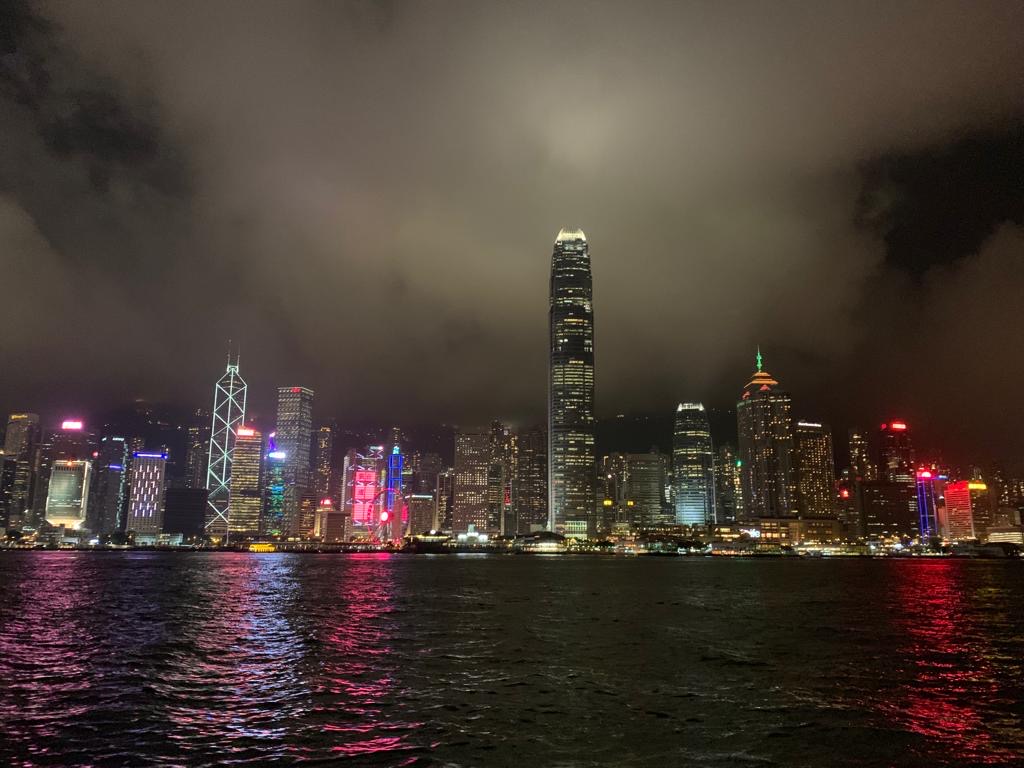
Hong Kong skyline, 2019 (Photo: A. Martin)